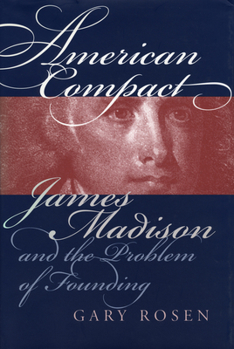American Compact: James Madison and the Problem of Founding
(Part of the American Political Thought Series)
For students of the early American republic, James Madison has long been something of a riddle, the member of the founding generation whose actions and thought most stubbornly resist easy summary. The staunchest of Federalists in the 1780s, Madison would turn on his former allies shortly thereafter, renouncing their expansive nationalism as a threat to the Constitution and to popular government. In a study that combines penetrating textual analysis with deep historical awareness, Gary Rosen stakes out important new ground by showing the philosophical consistency in Madison's long and controversial public life. The key, he argues, is Madison's profound originality as a student of the social compact, the venerable liberal idea into which he introduced several novel, and seemingly illiberal, principles. Foremost among these was the need for founding to be the work of an elite few. For Madison, prior accounts of the social compact, in their eagerness to establish the proper ends of government, provided a hopelessly naive account of its origin. As he saw it, the Federal Convention of 1787 was an opportunity for those of outstanding prudence (understood in its fullest Aristotelian sense) to do for the people what they could not do for themselves. This troublesome reliance on the few was balanced, Rosen contends, by Madison's commitment to republicanism as an end in itself, a conclusion that he likewise drew from the social compact, accommodating the proud political claims that his philosophical predecessors had failed to recognize. Rosen goes on to show how Madison's idiosyncratic understanding of the social compact illuminates his differences not only with Hamilton but with Jefferson as well. Both men, Madison feared, were too ready to resort to original principles in coming to terms with the Constitution, putting at risk the fragile achievement of the founding in their determination to invoke, respectively, the claims of the few and the many. As American Compact persuasively concludes, Madison's ideas on the origin and aims of the Constitution are not just of historical interest. They carry crucial lessons for our own day, and speak directly to current disputes over diversity, constitutional interpretation, the fate of federalism, and the possibilities and limits of American citizenship.
Format:Hardcover
Language:English
ISBN:0700609601
ISBN13:9780700609604
Release Date:July 1999
Publisher:University Press of Kansas
Length:250 Pages
Weight:1.25 lbs.
Dimensions:0.8" x 6.2" x 9.2"
Customer Reviews
2 ratings
Consistency in Madison's Constitutional Thinking
Published by Thriftbooks.com User , 23 years ago
Excerpted from The Independent Review (Summer 2001) by Hans EicholzRosen presents one point of view, which puts in practice a fairly pure version of what is generally called the "Straussian" interpretive approach. As a historian, I have some strong reservations about his method. Nonetheless, Rosen has made some significant contributions in this monograph.Rosen correctly notes that scholars have usually ignored Madison's actions as president. They tend to stop with his service in the first federal Congress, as if only his transition from nationalist Publius to state's rights Republican needed to be explained. Rosen's work seeks to fill an important gap in the literature. A nice example is his treatment of the Bank of the United States.Because Rosen relies almost entirely on Madison's own accounts, we get little sense of the historical context in which Madison was operating. Rather, we get a very streamlined theoretical account of Hobbes, Locke, and Aristotle, and caricatures of Jefferson and Hamilton. The effect is to produce a truncated picture of Madison's intellectual world.Rosen has made some useful suggestions for approaching Madison's constitutional thought, but he has not adequately developed them, primarily because of his inattention to history.
Madison Revealed
Published by Thriftbooks.com User , 24 years ago
American Compact merits serious consideration by those of legitimate concern with the evolvement of the American Ethic. Self described as a rehabilitation of Madison as a statesman and politician, Rosen's effort greatly exceeds his goal. Tracing the chronicles of Madison's intellect, enlightenment, and experience the myths of this Virginian are dismantled in a scholarly, and prudent fashion. From the claim of Madison's apostacy to his own nationalistic principles in the 1790s ,his demotion to a lieutenant of Jefferson's, or a 'trimmer' Rosen convincingly destroys those myths, and frees Madison from the framework of being considered only in light of his friend Jefferson, and, or, his protagonist Hamilton. In the spirit of Banning and McCoy a fresh view of the Father of the Constitution is afforded those who read the book, to those who study it, a conduit to the allusive Original Intent is possible. The greatest lessons that emerge are the veracity of Madison's claim of consistancy throughout his career, and a clear view of Madison's working to construct a document of national power, which he realized the average man could not accomplish, and then turning it back over to the citizenry not only for ratification, but for the participation Madison saw as required by the principles of the revolution.






